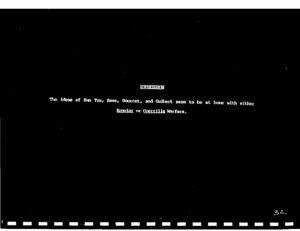Patterns of Conflict
| The works of |
| Works of John Boyd |
|---|
OODA WIKI Edition
Quantico Transcription
Okay? And here’s my point. When we talk about the ideas of Sun Tzu, or any of these other people, they’re at home with either regular or guerrilla warfare. Now the reason why I bring that out, we very often try to draw a big distinction between regular warfare on the one hand and guerrilla warfare on the other hand. I’m going show that they really, they come together in many different ways, particularly when we come down to the present. So we’ll be looking at that, both regular warfare and guerrilla warfare, particularly going to the 20th century, go deeper and deeper into guerrilla warfare along with regular warfare.
So with that in mind, then, what I want to look at now is what I call the three giants of the 19th century. First the super-practitioner, Napoleon, we’ll look at him in more detail. Second, the philosopher of war, Clausewitz, and third sometimes called the systemizer, Jomini. Clausewitz primarily was looking at the character and nature of war, Jomini was looking at it from an operational viewpoint. In any case, let’s look at all three.
Now the reason why we want to look at all three, why do we want to do that? Anybody think why I want to look at those three guys?
Audience: Synthesize—
Boyd: That’s one reason. Another reason, good reason, we want to see what ideas still hold. Remember, we’re trying to search for that kind of stuff. What works, what doesn’t work, can we use it today, et cetera. That’s exactly right. So we’re not just taking the whole bag of goods that goddamn, that Clausewitz was a smart son of a bitch, that’s going be the lens through which we’re going look at them all. You got to pull it apart first, so then you can put it back together. Pull Jomini apart, pull Clausewitz apart, Sun Tzu apart, and find those things, those invariants that hang together, we can apply them later.
[45:00] That’s part of it. The other part, theme, is because it had such a pervasive influence on modern operations. And people don’t even realize it. Some of it good, some not very good. So we’re going pull it apart, find what works, what doesn’t work so we can also do that synthesis. Had a very pervasive influence upon the way we look at war. So with that in mind, let’s look first at Napoleon, the super-practitioner.
